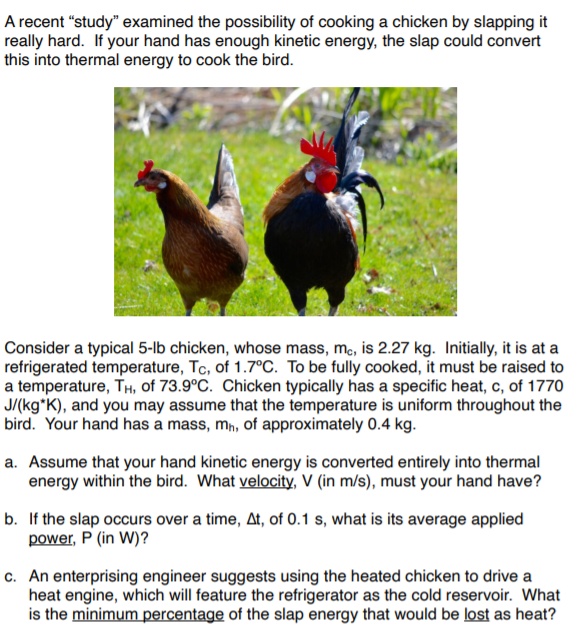Answered step by step
Verified Expert Solution
Question
1 Approved Answer
A recent study examined the possibility of cooking a chicken by slapping it really hard. If your hand has enough kinetic energy, the slap

A recent "study" examined the possibility of cooking a chicken by slapping it really hard. If your hand has enough kinetic energy, the slap could convert this into thermal energy to cook the bird. Consider a typical 5-lb chicken, whose mass, mc, is 2.27 kg. Initially, it is at a refrigerated temperature, Tc, of 1.7C. To be fully cooked, it must be raised to a temperature, TH, of 73.9C. Chicken typically has a specific heat, c, of 1770 J/(kg*K), and you may assume that the temperature is uniform throughout the bird. Your hand has a mass, mh, of approximately 0.4 kg. a. Assume that your hand kinetic energy is converted entirely into thermal energy within the bird. What velocity, V (in m/s), must your hand have? b. If the slap occurs over a time, At, of 0.1 s, what is its average applied power, P (in W)? c. An enterprising engineer suggests using the heated chicken to drive a heat engine, which will feature the refrigerator as the cold reservoir. What is the minimum percentage of the slap energy that would be lost as heat?
Step by Step Solution
There are 3 Steps involved in it
Step: 1

Get Instant Access to Expert-Tailored Solutions
See step-by-step solutions with expert insights and AI powered tools for academic success
Step: 2

Step: 3

Ace Your Homework with AI
Get the answers you need in no time with our AI-driven, step-by-step assistance
Get Started


